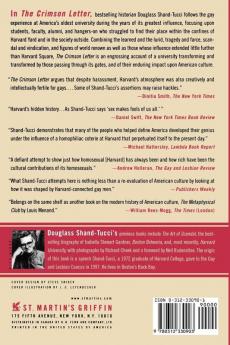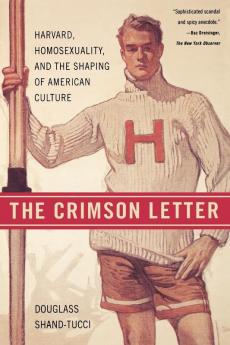English
Paperback
₹2348
₹2466
4.79% OFF
(All inclusive*)
Delivery Options
Please enter pincode to check delivery time.
*COD & Shipping Charges may apply on certain items.
Review final details at checkout.
Looking to place a bulk order? SUBMIT DETAILS
About The Book
Description
Author
In a book deeply impressive in its reach while also deeply embedded in its storied setting bestselling historian Douglass Shand-Tucci explores the nature and expression of sexual identity at America''s oldest university during the years of its greatest influence. The Crimson Letter follows the gay experience at Harvard in the nineteenth and twentieth centuries focusing upon students faculty alumni and hangers-on who struggled to find their place within the confines of Harvard Yard and in the society outside.Walt Whitman and Oscar Wilde were the two dominant archetypes for gay undergraduates of the later nineteenth century. One was the robust praise-singer of American democracy embraced at the start of his career by Ralph Waldo Emerson; the other was the Oxbridge aesthete whose visit to Harvard in 1882 became part of the university''s legend and lore and whose eventual martyrdom was a cautionary tale. Shand-Tucci explores the dramatic and creative oppositions and tensions between the Whitmanic and the Wildean the warrior poet and the salon dazzler and demonstrates how they framed the gay experience at Harvard and in the country as a whole.The core of this book however is a portrait of a great university and its community struggling with the full implications of free inquiry. Harvard took very seriously its mission to shape the minds and bodies of its charges who came from and were expected to perpetuate the nation''s elite yet struggled with the open expression of their sexual identities which it alternately accepted and anathematized. Harvard believed it could live up to the Oxbridge model offering a sanctuary worthy of the classical Greek ideals of male association yet somehow remain true to its legacy of respectable austerity and Puritan self-denial.The Crimson Letter therefore tells stories of great unhappiness and manacled minds as well as stories of triumphant activism and fulfilled promise. Shand-Tucci brilliantly exposes the secrecy and codes that attended the gay experience showing how their effects could simultaneously thwart and spark creativity. He explores in particular the question of gay sensibility and its effect upon everything from symphonic music to football set design to statecraft poetic theory to skyscrapers.The Crimson Letter combines the learned and the lurid tragedy and farce scandal and vindication and figures of world renown as well as those whose influence extended little farther than Harvard Square. Here is an engrossing account of a university transforming and transformed by those passing through its gates and of their enduring impact upon American culture.
Delivery Options
Please enter pincode to check delivery time.
*COD & Shipping Charges may apply on certain items.
Review final details at checkout.
Details
ISBN 13
9780312330903
Publication Date
-01-06-2004
Pages
-432
Weight
-610 grams
Dimensions
-156x234x22.31 mm











